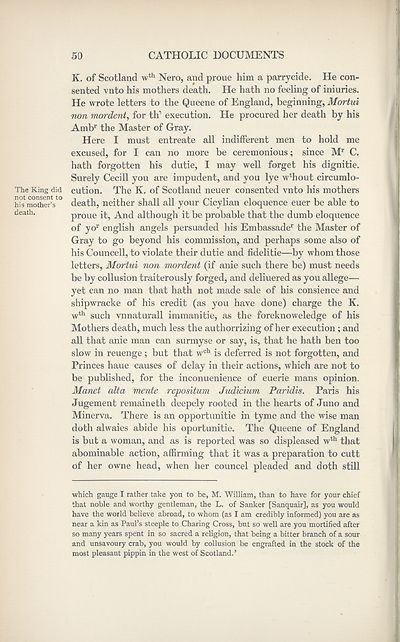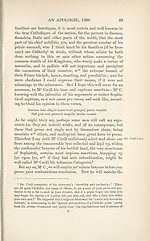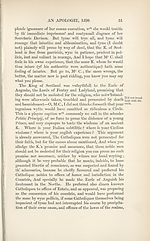Series 1 > Miscellany of the Scottish History Society (First volume)
(143) Page 50
Download files
Complete book:
Individual page:
Thumbnail gallery: Grid view | List view

50
CATHOLIC DOCUMENTS
K. of Scotland wth Nero, and prone him a parrycide. He con¬
sented vnto his mothers death. He hath no feeling of iniuries.
He wrote letters to the Queene of England, beginning, Mortui
non mordent, for th’ execution. He procured her death by his
Ambr the Master of Gray.
Here I must entreate all indifferent men to hold me
excused, for I can no more be ceremonious; since Mr C.
hath forgotten his dutie, I may well forget his dignitie.
Surely Cecill you are impudent, and you lye w'hout circumlo-
The King did cution. The K. of Scotland neuer consented vnto his mothers
his mother's10 death, neither shall all your Cicylian eloquence euer be able to
death. proue it, And although it be probable that the dumb eloquence
of yor english angels persuaded his Embassader the Master of
Gray to go beyond his commission, and perhaps some also of
his Councell, to violate their dutie and fidelitie—by whom those
letters, Mortui non mordent (if anie such there be) must needs
be by collusion traiterously forged, and deliuered as you allege—
yet can no man that hath not made sale of his consience and
shipwracke of his credit (as you have done) charge the K.
wth such vnnaturall immanitie, as the foreknoweledge of his
Mothers death, much less the authorrizing of her execution; and
all that anie man can surmyse or say, is, that he hath ben too
slow in reuenge; but that wch is deferred is not forgotten, and
Princes haue causes of delay in their actions, which are not to
be published, for the inconuenience of euerie mans opinion.
Manet alta mente repositum Judicium Paridis. Paris his
Jugement remaineth deepely rooted in the hearts of Juno and
Minerva. There is an opportunitie in tyme and the wise man
doth alwaies abide his oportunitie. The Queene of England
is but a woman, and as is reported was so displeased wth that
abominable action, affirming that it was a preparation to cutt
of her owne head, when her councel pleaded and doth still
which gauge I rather take you to be, M. William, than to have for your chief
that noble and worthy gentleman, the L. of Sanker [Sanquair], as you would
have the world believe abroad, to whom (as I am credibly informed) you are as
near a kin as Paul’s steeple to Charing Cross, but so well are you mortified after
so many years spent in so sacred a religion, that being a bitter branch of a sour
and unsavoury crab, you would by collusion be engrafted in the stock of the
most pleasant pippin in the west of Scotland.’
CATHOLIC DOCUMENTS
K. of Scotland wth Nero, and prone him a parrycide. He con¬
sented vnto his mothers death. He hath no feeling of iniuries.
He wrote letters to the Queene of England, beginning, Mortui
non mordent, for th’ execution. He procured her death by his
Ambr the Master of Gray.
Here I must entreate all indifferent men to hold me
excused, for I can no more be ceremonious; since Mr C.
hath forgotten his dutie, I may well forget his dignitie.
Surely Cecill you are impudent, and you lye w'hout circumlo-
The King did cution. The K. of Scotland neuer consented vnto his mothers
his mother's10 death, neither shall all your Cicylian eloquence euer be able to
death. proue it, And although it be probable that the dumb eloquence
of yor english angels persuaded his Embassader the Master of
Gray to go beyond his commission, and perhaps some also of
his Councell, to violate their dutie and fidelitie—by whom those
letters, Mortui non mordent (if anie such there be) must needs
be by collusion traiterously forged, and deliuered as you allege—
yet can no man that hath not made sale of his consience and
shipwracke of his credit (as you have done) charge the K.
wth such vnnaturall immanitie, as the foreknoweledge of his
Mothers death, much less the authorrizing of her execution; and
all that anie man can surmyse or say, is, that he hath ben too
slow in reuenge; but that wch is deferred is not forgotten, and
Princes haue causes of delay in their actions, which are not to
be published, for the inconuenience of euerie mans opinion.
Manet alta mente repositum Judicium Paridis. Paris his
Jugement remaineth deepely rooted in the hearts of Juno and
Minerva. There is an opportunitie in tyme and the wise man
doth alwaies abide his oportunitie. The Queene of England
is but a woman, and as is reported was so displeased wth that
abominable action, affirming that it was a preparation to cutt
of her owne head, when her councel pleaded and doth still
which gauge I rather take you to be, M. William, than to have for your chief
that noble and worthy gentleman, the L. of Sanker [Sanquair], as you would
have the world believe abroad, to whom (as I am credibly informed) you are as
near a kin as Paul’s steeple to Charing Cross, but so well are you mortified after
so many years spent in so sacred a religion, that being a bitter branch of a sour
and unsavoury crab, you would by collusion be engrafted in the stock of the
most pleasant pippin in the west of Scotland.’
Set display mode to:
![]() Universal Viewer |
Universal Viewer | ![]() Mirador |
Large image | Transcription
Mirador |
Large image | Transcription
Images and transcriptions on this page, including medium image downloads, may be used under the Creative Commons Attribution 4.0 International Licence unless otherwise stated. ![]()
| Scottish History Society volumes > Series 1 > Miscellany of the Scottish History Society (First volume) > (143) Page 50 |
|---|
| Permanent URL | https://digital.nls.uk/127082577 |
|---|
| Attribution and copyright: |
|
|---|
| Description | Over 180 volumes, published by the Scottish History Society, containing original sources on Scotland's history and people. With a wide range of subjects, the books collectively cover all periods from the 12th to 20th centuries, and reflect changing trends in Scottish history. Sources are accompanied by scholarly interpretation, references and bibliographies. Volumes are usually published annually, and more digitised volumes will be added as they become available. |
|---|


